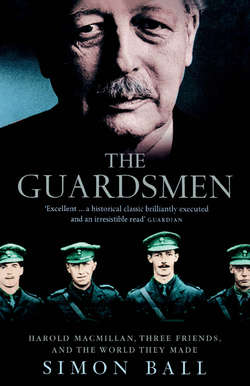Читать книгу The Guardsmen: Harold Macmillan, Three Friends and the World they Made - Simon Ball - Страница 6
PREFACE
ОглавлениеHarold Macmillan, Oliver Lyttelton, Bobbety Cranborne and Harry Crookshank all arrived at Eton in 1906, all served in the Great War in the same battalion of the Grenadier Guards and all entered the Cabinet under Winston Churchill during the Second World War. They helped Churchill to seize back power from the socialists in 1951 and once more joined his Cabinet, now as senior figures. Macmillan rose to be prime minister in 1957. This quartet thus socialized with each other, argued with each other, fought together and climbed the political ladder together for over forty years. ‘From the playing fields of Eton, to the horrors of the Western Front, to the pinnacle of political power,’ was not the blurb of a Jeffrey Archer novel but the reality of these men’s lives.
A friend of Crookshank and Cranborne’s, Paul Emrys-Evans defined their generation as those, born between Queen Victoria’s Golden Jubilee in 1888 and the turn of the century, who fought in the Great War. Subsequent studies have confirmed that this was indeed the group that bore the brunt of the front-line fighting and thus the heaviest casualties. Few Englishmen, on the other hand, have ever defined themselves solely as ‘old soldiers’. In any subsequent career, including politics, individuals cooperated with those both older and younger than themselves. In political life they might well have been drawn to those with similar life experiences, but this attraction seldom provided the main explanation for political action. It is hard to understand later events without a knowledge of generations, but unwise to expect an understanding of relationships within a generation to explain everything. Bearing this in mind, the present work is only in part a collective biography of four contemporaries. It certainly tries to evoke what living and working cheek by jowl with the acquaintances of childhood and the friends of wartime was like for Conservative politicians in the 1920s, 1930s, 1940s and 1950s. This evocation, however, merely sets the scene for the action.
As much as a collective biography this book is a comparative biography. It is concerned with those moments when its subjects interacted with each other but also with those situations where their actions might be contrasted. From early childhood Macmillan, Lyttelton, Cranborne and Crookshank were brought up with the notion that they were in competition with their contemporaries for the glittering prizes, the marks of honour accorded to men in public life. Although they were each under pressure to surpass the achievements of earlier generations of their own families, the main competition had to be against their own cohort. To use a sporting simile, an athlete can only race on the same track with those who reach their peak at the same age as himself. These four men came to the starting-line at the same time, and thus their performances can legitimately be measured against one another. The theme of this book is a race, a competition, willingly entered into, for power and glory. It seeks to explain why some men fell by the wayside while others prospered. ‘It’s not a flat race, it’s a steeplechase,’ as Winston Churchill once told Harold Macmillan.
